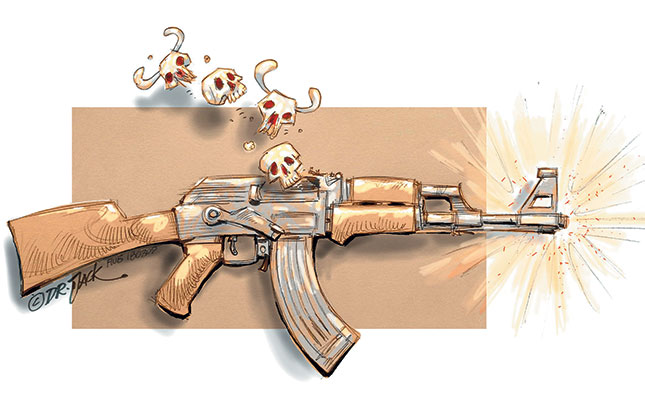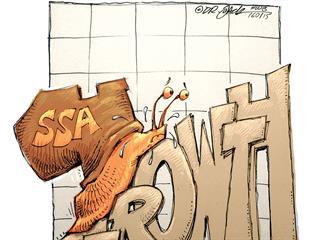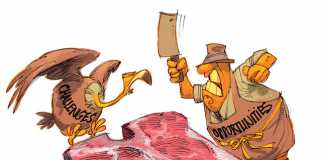
Photo: Dr Jack
Cattle rustling is by no means a new problem in Africa. Pastoral communities in East Africa and the Horn of Africa have dealt with it for generations.
Cattle rustling or raiding was integrated into cultural norms and accepted as a way to balance community wealth and power. Driven by community need, it was redistributive and reciprocal.
Local means of conflict resolution would prevent the escalation of violence, particularly among pastoral communities.
But these dynamics are changing.
The circulation of illicit small arms and light weapons has increased across the continent due to endemic armed conflict. This has made the once-customary practice of cattle rustling more violent, and more harmful.
A steadily worsening problem across the continent
Since the 1990s, small arms – particularly AK-47 rifles – have become weapons of choice for cattle rustlers, replacing traditional and less deadly weapons.
Cattle rustling has changed in other ways too. It has taken on a more commercial and political character, and with this, an increasingly transnational criminality.
It is also spreading to other parts of the continent. In Nigeria, for instance, the practice was traditionally less pronounced than in East Africa and the Horn.
Recently, cattle rustling has taken on a new and concerning scale in this country. A watershed moment occurred between 2013 and 2014, when approximately 7 000 cattle were rustled from commercial livestock farms and traditional herders in northern Nigeria, prompting military intervention and political contestation.
Cattle rustling can also be traced to activities of the extremist Boko Haram group in this part of Nigeria and other parts of the Lake Chad Basin.
The situation is no better in South Sudan, where the number of illegal small arms held by civilians is estimated to have increased to over 3,2 million since the violence started in December 2013.
The ongoing cycle of conflict and violence has seen cattle raiding occurring in tandem with the trade in illicit small arms.
Cattle are traded for guns and bullets – with catastrophic results. In an attack in November 2017, for example, at least 50 people were killed and about 60 women and children abducted in two raids by tribal militia in eastern South Sudan.
Local officials said most of the victims were civilians whose homes had been burned and livestock stolen by armed men from rival ethnic groups.
In early 2017, in Laikipia, Kenya, about 10 000 pastoralists armed with automatic rifles raided farms, wildlife reserves and conservancies, driving out 135 000 head of cattle. A few months later, security forces in Kenya intervened, killing hundreds of cattle in a gunfight with pastoralists.
Affected states have mainly responded in two ways: first, by using largely indiscriminate force, and second, by incentivising disarmament. Neither has been particularly successful.
The indiscriminate violence ratchets up community resentment, while the exchange of livestock for firearms and ammunition – as in South Sudan and Kenya – yields little result.
It’s time for action
So, what should governments be doing? The first step in tackling a range of organised crime activities, including cattle rustling, is to ratify and implement global arms control initiatives such as the Arms Trade Treaty and similar regional mechanisms.
Encouragingly, the policy framework for this already exists in East Africa and the Horn.
What is needed is action.
In 2008, countries in the East African Community under their umbrella policing body, the Eastern Africa Police Chiefs Cooperation Organisation, adopted the Protocol on the Prevention, Combating and Eradication of Cattle Rustling in Eastern Africa.
The protocol rallies the 11 member states to harmonise laws on cattle rustling, implement livestock identification systems and records, and build the capacity of police, customs
officials, border guards, judges and local leaders.
It also provides a framework for combined operations, mutual assistance and cooperation in law enforcement.
But the protocol has not yet entered into force, and until that happens, East Africa and the Horn will struggle to combat cattle rustling.
The impact of cattle rustling has become devastating. East African states have an
opportunity to counter the scourge effectively, and lead efforts on a problem that is rapidly affecting other parts of Africa. But doing so will require renewed commitment to ratify and implement the protocol.
The views expressed in our weekly opinion piece do not necessarily reflect those of Farmer’s Weekly.
This article was first published in ISS Today on 9 February 2018. It is republished in Farmer’s Weekly with the permission of ISS Africa and ISS Today.
Phone ISS Africa at 012 346 9500 or email [email protected]. Visit issafrica.org.











